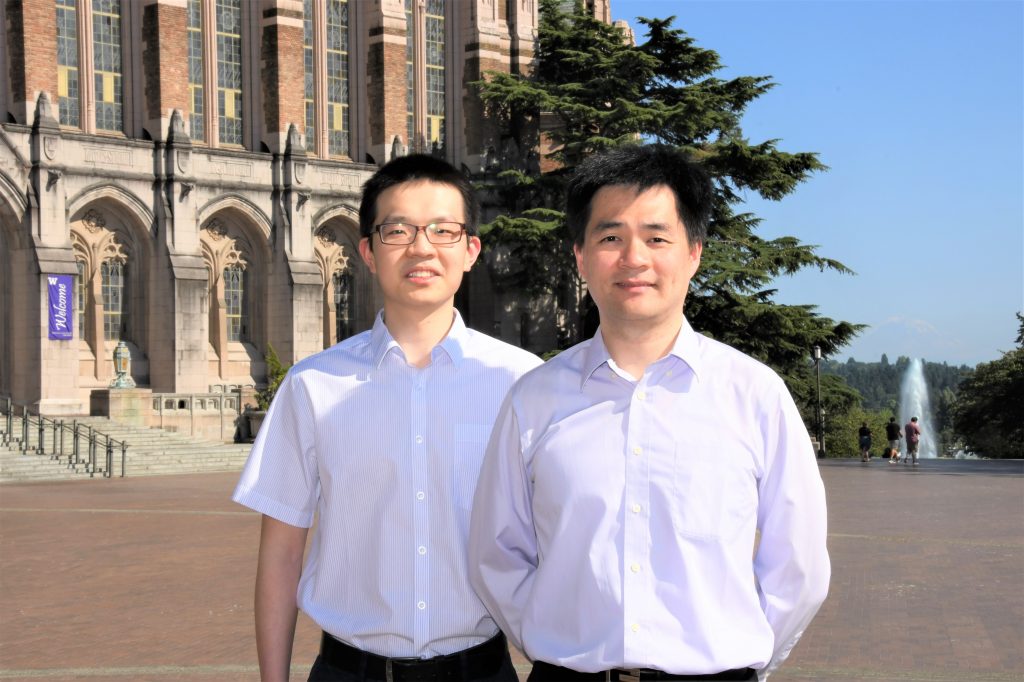
Xichen Li (left) and Yi-Hsiang Huang (right). Photo: Chris Rudell | UW ECE
Xichen Li and Yi-Hsiang Huang, graduate students at the UW Department of Electrical & Computer Engineering (UW ECE), have been named winners of the 2021 North America Qualcomm Innovation Fellowship (QIF) for their proposal, “Enhanced Self-Interference Suppression with Phase Noise Cancellation in Full-Duplex Radios.”
This research will help in the development of new full-duplex communication methods for devices such as smartphones and laptops that are capable of simultaneously transmitting and receiving data using the same frequency channel. With ever-increasing demand for higher data rates in congested wireless networks, such as the recently introduced 5G standard, Li and Huang’s research appears to be a very promising solution to this problem. With its scalable design, the proposal also has potential applications in areas such as autonomous vehicle radar systems, brain-computer interfaces, and a multitude of other smart devices using 5G communications systems.
Advised by UW ECE Associate Professors Jacques “Chris” Rudell and Visvesh Sathe, Li and Huang are both members of Rudell’s Future Analog System Technologies (FAST) Lab, which focuses on a broad range of topics related to analog, mixed-signal, radio-frequency (RF) and mm-wave circuits.
“I am truly thankful to my teammate, Yi-Hsiang, and our advisers, Chris Rudell and Visvesh Sathe, for their guidance and advice,” said Li. “I am excited to work with Qualcomm to explore new circuits and systems solutions to enhance the data rate and spectral efficiency of current and evolving wireless applications in the future research.”

Examples of 5G wireless communications applications. Photo courtesy Li and Huang
Qualcomm created the Qualcomm Innovation Fellowship program in 2009 in an effort to foster innovative, forward-thinking ideas and further research and development of new technological advances while also establishing a forum for Qualcomm to partner and routinely engage with university Ph.D. students. So far, the QIF program has awarded over $5M and continues to grow annually with the addition of more universities and candidates, expanding to Qualcomm’s international research centers as well. View all of the 2021 winners here.
“I am delighted to receive the QIF award and grateful to Qualcomm for supporting the project,” added Huang. “It is a great opportunity to work closely with Qualcomm’s engineers to benefit from their immense experiences for the success of our project. Their support for us is invaluable for our studies, building direct links to real-world problems.”
The QIF is highly competitive — from a total of 170 abstracts submitted among twenty-four universities invited to participate in this year’s North American competition, just sixteen teams were selected as winners. Each winning team will receive a monetary prize for their proposals.
Qualcomm also awarded Rudell and Sathe’s group a second grant of $65,000 for a proposal written by Rudell titled, “RF Transceiver Implementation Techniques to Allow Fully-Concurrent TX-RX Adjacent Channel Operation.” The proposal is for research also related to the QIF, with the grant money to be used to help fabricate a 28nm chip for mm-Wave 5G applications.
Watch a video of Li and Huang explaining the details of their proposal:
Ryan Hoover | UW ECE News

